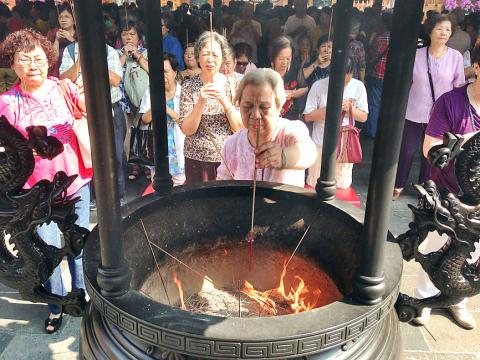Taipei’s Xingtian Temple’s (行天宮) announcement on Sunday that it would prohibit incense and food offerings to become more eco-friendly met with mixed reactions yesterday.
The popular temple, which is dedicated to Guan Gong (關公), a legendary third-century heroic general-turned-deity, is to remove its two incense burners and 12 offering tables beginning today. The temple is asking visitors to put their hands together in prayer instead of burning incense or offering food, stressing that what matters is a sincere heart.
Chang Wei-tung (張偉東), chief executive of the Lugang Matsu Temple (鹿港天后宮) in Changhua County, yesterday said that while he supports practices that aid the environment, he objects to the idea of removing incense burners and offering tables.

Photo: CNA
As the two items are indispensable during Taoist rituals, it would be disrespectful to the deities without them, he added.
Officials of the popular Chaotien Temple (朝天宮) in Yunlin’s Beigang (北港) said that while they approved of the Xingtian Temple’s move, they also need to be considerate toward the feelings of temple-goers, and as such they would wait and see before deciding whether to follow suit — a stance echoed by several temples in Greater Tainan.
Meanwhile, Singang Incense Artistic Culture Garden manager Chen Wen-chung (陳文忠) said that banning incense may project the false image that it has detrimental health effects, which he says is a blow to Taiwanese incense manufactures who have worked to make high-quality incense.
He said that while cheap Chinese-made incense might contain harmful chemicals, most Taiwanese incense products are made from sandalwood or herbs and are harmless to people.
Chiayi County’s Sibei Liousing Temple (溪北六興宮) chief executive Chiang Hsiao-fan (江筱芃) said that although it is a trend among local temples to reduce the use of incense burners, getting rid of them is “too big a culture shock for Taoists.”
She recommended retaining them and leaving the choice of whether to burn incense to worshipers.
Meanwhile, many incense vendors near the busy entrance to the Xingtian Temple expressed concern, saying that it would destroy their livelihoods.
Xingtian Temple deacon Lee Chu-hua (李楚華) said that it is most important that a worshiper be pious, and that without the offerings, no more food will be wasted.
Lee said that, as a tradition, visitors to the temple often offer rice pudding, but since the Consumers’ Foundation found a few years ago that many rice pudding products contained high levels of preservatives, visitors have stopped taking their offerings home after the rituals.
Consequently, the temple throws away about 1,000 rice puddings each day, resulting in a tremendous waste of food, he said.
Lee said that as far back as 2003, temple administrators said that it would start adopting environmental and waste-reduction practices.
“Over the years, the temple has been reminding visitors to embrace environmentally friendly practices on a daily basis. Many vendors have anticipated this day to arrive and have been doing business elsewhere,” Lee said.
Additional Reporting by Chang Tsung-chiu and Yu Pei-ju

A magnitude 4.9 earthquake struck off Tainan at 11:47am today, the Central Weather Administration (CWA) said. The hypocenter was 32.3km northeast of Tainan City Hall at a depth of 7.3km, CWA data showed. The intensity of the quake, which gauges the actual effect of a seismic event, measured 4 in Tainan and Chiayi County on Taiwan's seven-tier intensity scale, the data showed. The quake had an intensity of 3 in Chiayi City and County, and Yunlin County, while it was measured as 2 in Kaohsiung, Nantou County, Changhua County, Taitung County and offshore Penghu County, the data showed. There were no immediate reports of

The Chinese Nationalist Party (KMT) is maintaining close ties with Beijing, the Democratic Progressive Party (DPP) said yesterday, hours after a new round of Chinese military drills in the Taiwan Strait began. Political parties in a democracy have a responsibility to be loyal to the nation and defend its sovereignty, DPP spokesman Justin Wu (吳崢) told a news conference in Taipei. His comments came hours after Beijing announced via Chinese state media that the Chinese People’s Liberation Army’s Eastern Theater Command was holding large-scale drills simulating a multi-pronged attack on Taiwan. Contrary to the KMT’s claims that it is staunchly anti-communist, KMT Deputy

RESPONSE: The government would investigate incidents of Taiwanese entertainers in China promoting CCP propaganda online in contravention of the law, the source said Taiwanese entertainers living in China who are found to have contravened cross-strait regulations or collaborated with the Chinese Communist Party (CCP) could be subject to fines, a source said on Sunday. Several Taiwanese entertainers have posted on the social media platform Sina Weibo saying that Taiwan “must be returned” to China, and sharing news articles from Chinese state media. In response, the Mainland Affairs Council (MAC) has asked the Ministry of Culture to investigate whether the entertainers had contravened any laws, and asked for them to be questioned upon their return to Taiwan, an official familiar with the matter said. To curb repeated

Weather conditions across Taiwan are expected to remain stable today, but cloudy to rainy skies are expected from tomorrow onward due to increasing moisture in the atmosphere, according to the Central Weather Administration (CWA). Daytime highs today are expected to hit 25-27°C in western Taiwan and 22-24°C in the eastern counties of Yilan, Hualien, and Taitung, data on the CWA website indicated. After sunset, temperatures could drop to 16-17°C in most parts of Taiwan. For tomorrow, precipitation is likely in northern Taiwan as a cloud system moves in from China. Daytime temperatures are expected to hover around 25°C, the CWA said. Starting Monday, areas